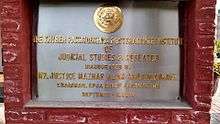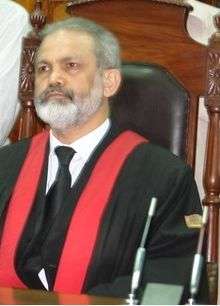Khyber Pakhtunkhwa Judicial Academy
Kyber Pakhtunkhwa Judicial Academy is an institution of higher learning in Peshawar, Pakistan which focuses on legal and judicial studies. Its mission is "to change the attitude of young law graduates as judges and to inculcate in them patience, sobriety, confidence, discipline and skill of high quality legal reasoning; to develop their capacity; to enable them to create harmony among all justice sector institutions; to sensitize them to the rights of all litigant public, notably, of the vulnerable communities; and to make them leaders to contribute to the rule of law." for detail visit KPJA Official Website
Founding
The academy was founded in March 2011 by the Chief Justice of Peshawar High Court, Justice Dost Muhammad Khan. The governor of Khyber Pakhtunkhwa established the academy with an ordinance issued on 28 December 2011. On 17 January 2012, the Khyber Pakhtunkhwa Assembly passed the Khyber Pakhtunkhwa Judicial Academy Act.[1] The academy was inaugurated on 18 July 2012 by its chairman, Justice Khan.
Board of governors
The academy is governed by a board of governors, which includes the chief justice of the Peshawar High Court as chairman, the court's senior puisne judge as vice-chairman. Members include the additional chief secretary of the provincial government, the finance secretary, the secretary of law, human rights and parliamentary affairs, the provincial advocate general, the Peshawar High Court registrar, the PHC Member Inspection Team, the PHC additional registrar, the principal of the Law College of the University of Peshawar and the director-general as secretary.
Training
The academy has conducted more that 100 training sessions for members of the provincial judicial system, including judges, attorneys, probation officers, police and Federally Administered Tribal Areas administrators. Training of trainers was also conducted after a training-needs-assessment survey. The academy have conducted training in substantive and procedural law, judgment writing, case and court management, mediation, human rights, the right to information and building judicial capacity of political administration in the FATA. Training reports are available on the academy website. [2] The academy has hosted more than 30 workshops and seminars on contemporary provincial issues in partnership with international and national humanitarian bodies such as the UNDP, the World Bank, UNICEF, GIZ, SACH, DOST and Foundation da Khwaindo Kor.
Postgraduate institute

The Judicial Academy was granted degree-awarding status by the Higher Education Commission. In early 2014, degree courses in legal studies and research (including LL.M. and Ph.D) were planned.[3]
Research wing
The Academy is equipped with Research wing supported by the UNDP which has so far produced reports on two research projects. The Academy conducted the following three studies with the support of the donors organizations; Gaps between formal and informal justice systems in Malakand,Civil cases culminating to criminal cases—a baseline study in trends in crimes in Swat and Dir Upper districts, and Efficacy of judicial system in Malakand.
Radio Meezan
Radio Meezan is one of Pakistan's first legal-awareness radio stations, broadcasting programs on legal awareness, human rights and children's and women's rights. Its purpose is to provide information, education, awareness, sensitization, advice, drama, public-service announcements and special programming on national and international days.[4] The station's policy is to maintain high standards of accuracy, objectivity, balance, simplicity and decency in its broadcasts, focusing on issues related to law and justice in society. Radio Meezan encourages contributions from all, from public officials and lawyers to ordinary citizens.
Mediation center
The academy established a mediation center, the first of its kind in the country, to resolve disputes using alternative methods. The center is supported by the United Nations Development Programme.[5]
Information technology
The academy is equipped with information-technology tools and strategies to enhance their participants' learning experience. The ICT department developed and maintains the following:
- Academy and Radio Meezan websites
- Online evaluation forms, using Google for Education
- Management of Google apps, the network, work stations and firewalls
- Payroll, library-information, assets-tracking, biometric-attendance, file-tracking and training-information-management systems
Academic links
The academy signed memoranda of understanding with the University of Malakand, Hazara University and Abdul Wali Khan University Mardan to share best practices and support each other academically, particularly in legal education. The Institute of Management Sciences in Peshawar is also working with the academy to develop curricula and assess training needs.
Director-general

Justice Zia-ud-din Khattak, judge of the provincial election tribunal and the FATA and an honorary member of the search and scrutiny committee of the provincial Ehtesab Commission, is the academy's director-general. Khattak delivered the following address:
The constitution of the Islamic Republic of Pakistan makes it mandatory upon the state to provide inexpensive and expeditious justice to the people. It also guarantees the people, among others fundamental rights, equality before law and establishing an independent Judiciary. The Judicial independence rests on public confidence, which, in turn depends when judges, lawyers, prosecutors/government pleaders and court staff are adequately trained in performing their job efficiently and professionally.To maintain and improve the professional competency of all concerned performing judicial functions, the Khyber Pakhtunkhwa Judicial Academy has been established vide KP Judicial Academy Act (Act No. IV of 2012), with a view to impart training to the Judicial officers and personnel concerned with the administration of justice so as to develop their capacity, professional competence, and ethical standards for efficient dispensation of justice and matters connected therewith and incidental thereto.
After joining the Provincial Civil Service (Judicial Branch) in 1978 and while heading the First Pilot Project on Delay Reduction in Courts under AJP in 2001-2002, I and my team used to impart training ( though informally) to our juniors and court staff that had produced good results in reducing backlog and delay.
Now after assuming charge of present office my future vision (Inshallah) is to examine the actual training needs of the judges and all concerned with justice sector, as without knowing what is required to be imparted, the judicial training program will not be effective. Since pre-service training has been made mandatory for confirmation in judicial service vide Peshawar High Court notification No. 5-J dated 20.12.2003, therefore, the law instructions curriculum is to be designed for judges on priority basis, besides law officers and staff members to keep them current in all areas of law and practicing skills. Senior judges, advocates, barristers, having academic aptitude would be invited to join the Academy to share their experience; and last but not the least, the emphasis shall be on integrity and development of character and aptitude so as to attain Public Trust and Confidence in the administration of justice. May Allah Almighty help and guide me in the task ahead.[6]
External links
- KPJA Official Website
- Federal Judicial Academy, Islamabad
- Punjab Judicial Academy, Lahore
- Sind Judicial Academy, Karachi
- Bureau Report. "CJ opens postgraduate judicial institute tomorrow". dawn.com.
- "Judicial academy of PHC is the best academy, CM". Pakistan News.
- "KP Judicial Academy to have TV, radio channels". Pakistan Press Foundation (PPF).
- "Sach :: SACH Activities". sach.org.pk.
- "In pictures: UN Assistant Secretary General visits KP Judicial Academy Peshawar. - View & Discuss". Apni Ronaq.
- Bureau Report. "KP Judicial Academy to boost justice system: CJ". dawn.com.
- Bureau Report. "KP Judicial Academy opens next week". dawn.com.
- "For a law degree: Judicial Academy gets NOC". The Express Tribune.
- "KP institute of judicial studies inaugurated - ePaper - DAWN.COM". dawn.com.
- Moxet Khan. "KP Judicial Academy to launch FM radio channel". Pukhtoogle.
- "PA passes KP Judicial Academy Bill 2011". Pakistan News.
- http://www.pakistandespatch.com/hec-issues-noc-kp-judicial-academy-degree-award-status/
- "BoG of KP Judicial Academy to meet on Wednesday.". thefreelibrary.com.
- "Chief Justice Peshawar high court innugrate [sic] the judical academy [sic]". Demotix. Archived from the original on 6 July 2015.
References
- ↑ "The Khyber Pakhtunkhwa Judicial Academy Act,2012". Provincial Assembly of Khyber Pakhtunkhwa. Retrieved 29 March 2016.
- ↑ "Digital Library - Training Reports". Khyber Pakhtunkhwa Judicial Academy, Peshawar, Pakistan.
- ↑ "KP Judicial Academy to issue degrees". The News International, Pakistan. 20 February 2014.
- ↑ "Radio Meezan FM 96.6". Retrieved 30 March 2016.
- ↑ "Arbitration: K-P Judicial Academy to inaugurate mediation centre". The Express Tribune. Retrieved 29 March 2016.
- ↑ "Message by Director General". Khyber Pakhtunkhwa Judicial Academy. Retrieved 29 March 2016.